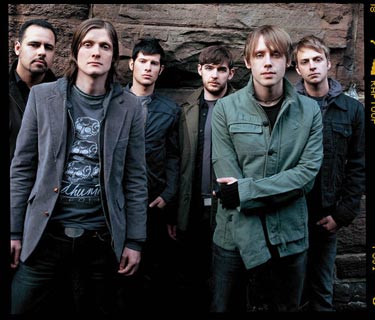Bring the lights back up: Geoff Rickly of Thursday
by Mary Borsellino
Originally published: Faster Louder, February 2008.

Thursday changed post-hardcore music forever; you can't turn on a radio or open a magazine without seeing some aspect of the generation of post-hardcore bands that followed in their wake. Unlike most bands with huge legacies, however, they're still around themselves. Their most recent release is the DVD/CD Kill The House Lights from Victory Records, and they're heading to Australia for the Soundwave festival and two side shows in late February.
Kill The House Lights is a strange DVD to watch, far more downbeat and subdued than typical band documentaries.
"We played it at a film festival on a big screen," recounts Geoff Rickly, Thursday's lead singer. "And at the end there were a bunch of people crying. I didn't realise it would have that effect. They said it wasn't because it was sad, but because it felt to them like we were finished with the band, and they hoped that wasn't the case."
"That was our goal with the DVD - to make everything that came before literally history and give it an ending. Now we can start a new thing and leave the baggage behind. We're not finished with the band. We've got a new full-length record coming out this year, and we're doing a split twelve-inch with this cool band from Japan called Envy, and I'm in a side project called United Nations with Daryl Palumbo of Head Automatica and Glassjaw."
Does Geoff feel like Thursday is a part of the current high-profile wave of post-hardcore bands?
"I think we're a different thing," muses Geoff. "I guess the group of bands we were in when we started out, we changed what was going on in the genre; we shifted post-hardcore into something avant garde, strange and dark. Now most of those bands are broken up and there's the stuff that came after us, which I think has moved to more of the pop side. I like the bands that are in that shift, and I like that we're something different that's going on at the same time."
I ask Geoff if it's ever difficult to still perform songs that were written in another era of his life.
"There are only a few like that; stuff off the first record that I don't feel any connection with any more. I think that's because in those days I'd use them as an escape. But most of the songs become a strange meditation through repeatedly playing them. They're this weird connection the band has with each other. I've played 'Understanding In A Car Crash' 1500 or 1700 times, and I'm not the least bit tired of it. It feels like it's part of being a human being to me, now. You don't wake up in the morning and think 'I'm so tired of waking up!'. That's how it feels now."
Thursday's tense first Australian tour saw the band come close to parting ways. Does that colour how he feels about the country now?
"Not at all," Geoff responds immediately. "I love Australia. It's my favourite place to tour, apart from some places in America. It was only that first tour that was difficult-Taste of Chaos was amazing. It was such a fantastic experience. My wife has family in Sydney, so I get down there even when I'm not with the band. I've already been there this year."
"Festivals like Soundwave are great, because it's so expensive for a band to do an Australian tour, especially with our dollar being so low now. It's so much better when a festival organises all of that-and you get to tour with all these bands that are your friends."
The obvious change to the music world since Thursday started is the rise of downloading. Are there any other shifts Geoff has noticed in the industry since his band began?
"It's connected to downloading, because it's the internet, but I'd have to say the way everyone talks shit, even when they haven't heard a record. It disappoints me that people go and see what everyone else is saying instead of making their own opinion. They just decide it sucks before it's come out. When I used to get a new album, I'd have to go hunt it down and then I'd take it home and listen to it and think really hard about what was great about each track, and then I'd decide if it was a good record or not."
"The great thing about downloading, though, is that it's going to kill the major record labels, which is a good thing. Major labels make the artist feel like it's a special privilege they're being given if the label's even willing to hear their opinion on anything, which is bullshit. If labels didn't have the artists and the songs, what are they going to sell?"